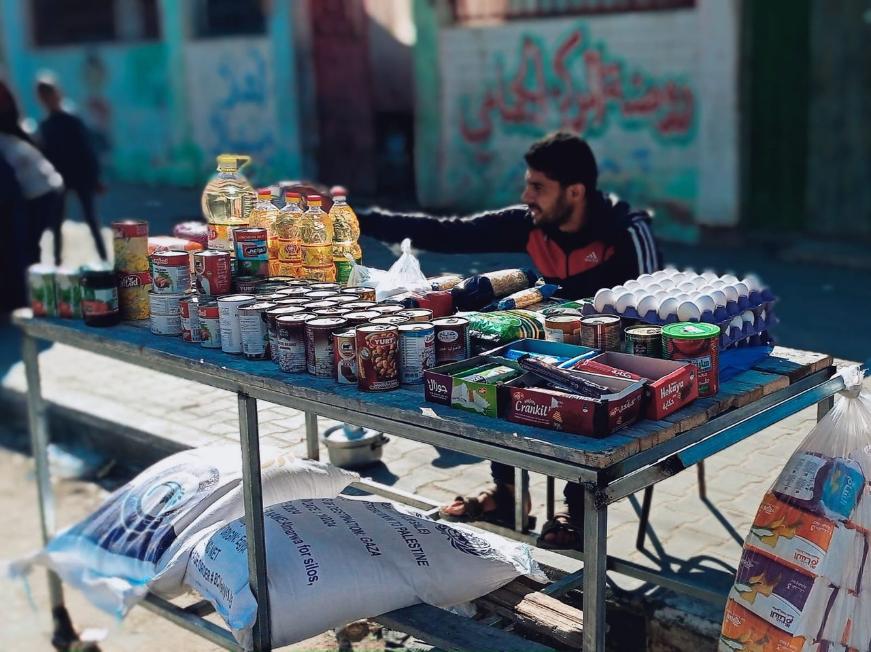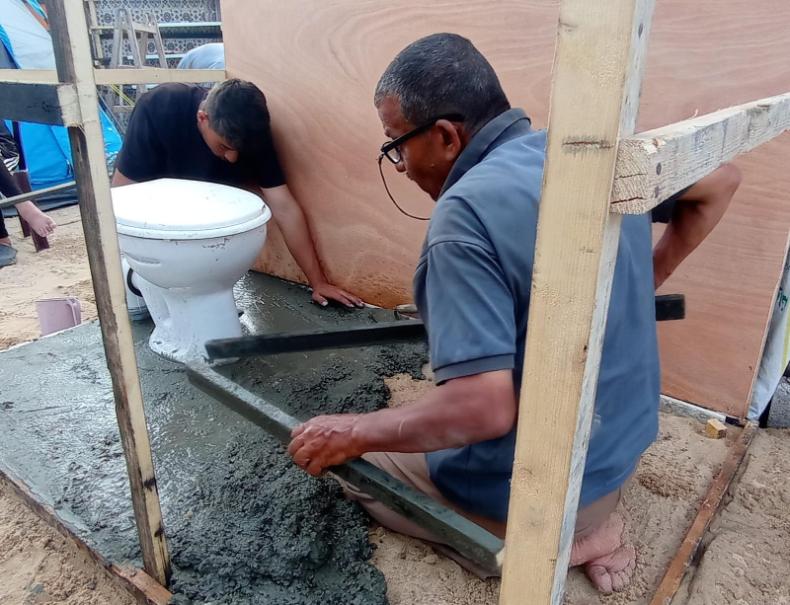Roots
A youth-led organization provides support, empowerment, and reasons for hope to families displaced by the war on Gaza.

Amid the ruins of the genocidal war in Gaza, a beam of hope shines: a grassroots community-support organization led by local youth called Roots, جذور.
I founded Roots in January 2024 and work with six other young people here. Funds for the project are raised by my mentor, Paul Costello, who runs a peace program in Washington, D.C.
My journey with Roots began with an important realization: The roots of resilience must hold deep within my community to prevent further displacement such as occurred with the Nakba of 1948. The objective is to encourage Palestinians to reconsider emigration and instead find strength and purpose in their homeland.
This initiative provides people who are displaced with things they desperately need, and we also help build small enterprises so that people can support themselves. Each intervention is a commitment to rebuilding lives and restoring dignity.
Helping families help themselves
Roots was launched in Rafah, which is where I lived until recently. I had a small house in eastern Rafah, and when it was bombed I moved to my grandfather’s house, also in Rafah.
Our clothing project has benefited many families. We arranged with a clothing trader to allow 100 families to visit his store and purchase what they needed, not what someone else determined they might need.
A neighborhood committee suggested names of potential beneficiaries, and we selected the ones to receive coupons based on several criteria: Were they displaced? Were they living in a tent? Did they have children? Did they lack a source of income?
Each voucher was worth 300 NIS, and a Roots team member supervised the process.
Another significant project was our installation of six solar panel systems in various locations among the tent encampments in Rafah. When we learned that a large number of solar panels were sitting unused on farmland, we purchased several and built the systems (including batteries and controllers) that have enabled many families to use them for powering their phones and other electronic devices.
Roots also launched two small enterprise projects. For a woman named Om Ahmed, we built a clay oven. My brother Ali was the builder of the oven; he used to manage a marble factory so has a wide range of skills. Many families have relied on this oven to bake their bread, and Om Ahmed is able to earn some money by maintaining the oven and charging a small fee to users.

A second small enterprise project benefited Mohammed Said, a displaced friend of mine. He struggled to put food on the table for his family in Rafah after Oct. 7, 2023, when the Israel Occupation Forces made its way into the Gaza Strip.
With no access to resources, he faced the harsh realities of displacement. “I had never thought my life would go down in a minute,” he said. “I wish I could go back to the Gaza where I was the Mohammed I knew.”
Roots provided Mohammed with a goods stall and gave him a small grant so he could buy and resell goods, including eggs, flour, salt, canned foods, and even children’s sweets and chocolate. Through his small business, Mohammed found new hope and confidence in sustaining his family. “My life began to thrive,” he says.

Roots must move
With the incursion into Rafah by the IOF that started in May 2024, I was forced to move to Al-Mawasi, where I am now living in a tent. It is hard, but what helps my spirits is to continue working with my colleagues for Roots.
I am happy to report that Mohammed was able to move his goods stall to Al-Mawasi so he can continue to earn an income to feed his family. Om Ahmed also was able to move her oven, and I sometimes visit her to get some bread!
Out first project in this new location has been to build bathrooms for the displaced population. Under the supervision of my uncle Khalid, a civil engineer who volunteered for this project, my team has built four of them using funds we had available.
I selected the beneficiaries among my new neighbors in the camp who lacked a source of income and struggled to have proper bathroom facilities. This is really important because there are now more than 831,000 people living in Al-Mawasi, where there is very little infrastructure.
We will add more projects in our new location as funds become available.

Roots of hardship, flowers of hope
My mentor’s words, “We can grow from the ground up,” resonate deeply within me, reinforcing the urgency of Roots’s mission. In a world torn apart by genocide, where the very foundations of peace are threatened, the work of Roots takes on profound significance. With each passing day, I am reminded of the resilience and strength of my displaced friends, acquaintances, and community members.
We are proving that from despair, new beginnings can emerge. Together, we are showing that with determination and compassion, even the deepest roots of hardship can give rise to the most beautiful flowers of hope.
This story was first published by We Are Not Numbers. It was written by Abdallah al-Jazzar, as a personal narrative from under the relentless bombardment of Gaza by Israel.